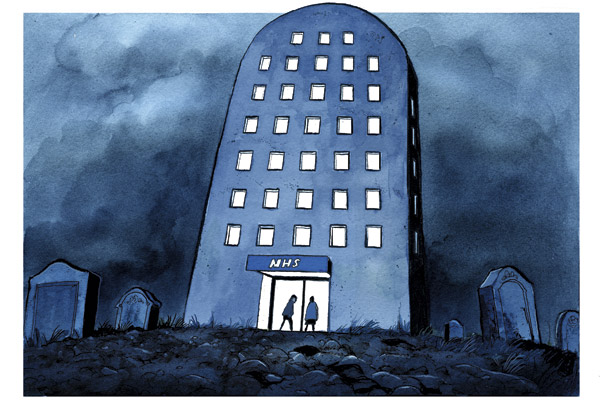It was Janet Tracey’s family who brought about a change in the law regarding Do Not Resuscitate notices on patient’s notes in hospital. Thanks to their efforts, hospitals will now have to consult patients and their families before instructing medics that they shouldn’t go out of their way to provide life-saving treatment. Mrs Tracey had made perfectly clear that she wanted to be in on her own case; didn’t matter – she got a DNR notice anyway.
I’m not sure whether I was in quite this situation a couple of years ago when my mother was in St Mary’s Paddington after a fall. She succumbed to an infection which she may have contracted before coming to the hospital: don’t know. But when it was clear that her condition was deteriorating, it was I who brought it to the attention of the medics. At one point, a young female doctor told me that if it came to the worst, they wouldn’t be resuscitating; she just wanted to let me know. I was so thoroughly demoralised and am anyway so inclined to assume doctors are both omniscient and benevolent, like God, I said: ‘whatever you think best’. It was only later that night when things were looking bad that a young male doctor came to put the same question. ‘I was told we shouldn’t resuscitate,’ I told him feebly. ‘Yes, but you’ve only got one mother, haven’t you?’ he said. It felt like a weight lifting from me. ‘Yes,’ I said. ‘Just do whatever it takes.’ She recovered. I’ve prayed for that young doctor ever since.
Now what struck me then and now about the situation, and indeed about Mrs Tracey’s, is that there is a terrifying divide in treatment of the elderly between those who have family to fight their corner and those who don’t. Had my mother been childless and alone, I’m not at all sure what would have happened.
It’s the same when you get those horror stories about the abuse of the elderly or mentally infirm in care homes by people who are meant to be looking after the residents or inmates; if you don’t have the luck to have an undercover Panorama reporter on the premises or a family ruthless enough to install a camera in your room, then you’re toast if you happen to be minded by the cruel or uncaring. You’re at the mercy of the system as supervised by the Care Quality Commission. What we need for the frail elderly is a system of supervision and care, in hospitals or homes, which is as compassionate when it comes to those who don’t have relations who care about them as those who do. In terms of care homes, CCTV cameras, with unscripted inspections, should be the minimum norm – and criminal prosecutions, not warnings or sackings, for those who abuse the frail and old. When it comes to hospitals, it seems right, if a little overdue, that patients should be consulted about their own life and death.







Comments